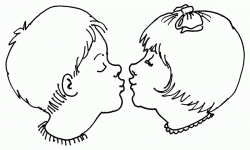Lip service: Apes like to pucker up, too
Q. What's so uniquely human about the way we pucker up to plant a kiss? –A. Jolie
A. Our lips are said to be "everted," or pursed outward, says Sheril Kirshenbaum in “The Science of Kissing: What Our Lips Are Telling Us," reported in Discover magazine. Though we're the only everters, we're not the only mammals to engage in kissing-like behavior: Great apes too press lips together to express excitement, affection, or reconciliation.
Why we humans do this is unclear, though it may have echoes of our early feeding experiences; through nursing and receiving pre-chewed food from a parent's mouth, infants may learn to associate lip pressure with loving attention. Or it may be that over time, brushing of the lips became an accompaniment to smelling a loved one's cheeks, which has long served as a means of recognition in cultures from New Zealand to Alaska.
Early literary evidence for kissing comes from northern India's Vedic Sanskrit texts, of 1,000 to 2,000 years ago. Yet the act is not entirely universal, leading anthropologists like Vaughn Bryant of Texas A&M to think it might actually be a learned behavior. In ancient times, "the Roman military introduced kissing to many non-kissing cultures, after its conquests were over, presumably," he says. Later, it was European explorers who carried the torch.
Q. What was the only sport invented entirely in the U.S.? –R. Sampson
A. Basketball, though it was actually devised in 1891 by Canadian James Naismith, who was asked by Springfield College in Massachusetts to create a sport that could be played indoors without special new equipment, report John Lloyd and John Mitchinson in The Book of General Ignorance.
"He is supposed to have thought of the idea as he screwed up sketch after sketch of ideas for games and aimed the balls of paper at his wastebasket across the room," they write.
Initially, players dribbled a soccer ball up and down a floor and earned points by landing the ball in a peach basket nailed high on a wall. After every score, someone had to climb a ladder or poke the ball out with a long pole. It was 21 years before anyone got around to putting a hole in the bottom of the basket.
"In 1959, 20 years after his death, James Naismith was inducted into the Basketball Hall of Fame, now the Naismith Memorial Hall of Fame," according to the authors.
Q. In the enchanting parable of The Little Prince, the mysterious visitor is said to come from a planet barely larger than a house. What would that be like— for instance, could the Little Prince even walk about there? –K. Middleton
A. As calculated by J. Strand, the tiny gravitational pull of such a small planet would make walking on the surface extremely difficult, says Jearl Walker in The Flying Circus
of Physics. If the Prince were to move faster than 11 centimeters per second (0.25 mph), he would be launched into space, unable to return; even at the slower pace of 8 centimeters per second (0.18 mph), he would be sent into orbit around the planet.
Q. Thinking really big, how many stars are there in the entire cosmos? Previous estimates say 100 billion trillion, or 100,000,000,000,000,000,000,000. But recent surprising evidence has led scientists to triple their estimate, according to Science News magazine. So can you say how many zeroes now need to be added to the already colossal figure? –T. Brahe
A. You can hold the zeroes because a tripling wouldn't require any more of them; instead, just change the initial 1 to a 3. Adding a single zero would naturally multiply the number not by the desired 3 but by 10; a second zero would increase it a hundredfold.
~
Send Strange questions to brothers Bill and Rich at [email protected]
